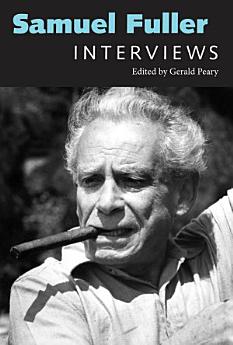Samuel Fuller: Interviews
Gerald Peary
Mai 2012 · Univ. Press of Mississippi
E-Book
160
Seiten
reportBewertungen und Rezensionen werden nicht geprüft Weitere Informationen
Über dieses E-Book
In the early twentieth century, the art world was captivated by the imaginative, original paintings of Henri Rousseau, who, without formal art training, produced works that astonished not only the public but great artists such as Pablo Picasso. Samuel Fuller (1912–1997) is known as the “Rousseau of the cinema,” a mostly “B” genre Hollywood moviemaker deeply admired by “A” filmmakers as diverse as Jim Jarmusch, Martin Scorsese, Francois Truffaut, Jean-Luc Godard, and John Cassavetes, all of them dazzled by Fuller’s wildly idiosyncratic primitivist style.
A high school dropout who became a New York City tabloid crime reporter in his teens, Fuller went to Hollywood and made movies post-World War II that were totally in line with his exploitative newspaper work—bold, blunt, pulpy, excitable. The images were as shocking, impolite, and in-your-face as a Weegee photograph of a gangster bleeding on a sidewalk. Fuller, who made twenty-three features between 1949 and 1989, is the very definition of a “cult” director, appreciated by those with a certain bent of subterranean taste, a penchant for what critic Manny Farber famously labeled as “termite art.”
Here are some of the crazy, lurid, comic book titles of his movies: Shock Corridor, The Naked Kiss, Verboten!, and Pickup on South Street. Fuller isn’t for everybody. His fans have to appreciate low-budget genre films, including westerns and war movies, and make room for some hard-knuckle, ugly bursts of violence. They also have to make allowance for lots of broad, crass acting, and scripts (all Fuller-written) that can be stiff, sometimes campy, often laboriously didactic. Fuller is for those who love cinema—images that jump, shout, and dance. As he put it in his famous cigar-chomping cameo, acting in Jean-Luc Godard’s Pierrot le fou (1965): “Film is like a battleground . . . love, hate, violence, death. In a single word: emotion.”
After directing, Fuller's greatest skill was conversation. He could talk, talk, talk, from his amazing experiences fighting in World War II to the time his brother-in-law dated Marilyn Monroe, and vivid stories about his moviemaking. Samuel Fuller: Interviews is not only informative about the filmmaker’s career but sheer fun, following the wild, uninhibited stream of Fuller’s chatter. He was an incredible storyteller, and no matter what the interview was, he had stories galore for all sorts of readers, not just for academics and film historians.
A high school dropout who became a New York City tabloid crime reporter in his teens, Fuller went to Hollywood and made movies post-World War II that were totally in line with his exploitative newspaper work—bold, blunt, pulpy, excitable. The images were as shocking, impolite, and in-your-face as a Weegee photograph of a gangster bleeding on a sidewalk. Fuller, who made twenty-three features between 1949 and 1989, is the very definition of a “cult” director, appreciated by those with a certain bent of subterranean taste, a penchant for what critic Manny Farber famously labeled as “termite art.”
Here are some of the crazy, lurid, comic book titles of his movies: Shock Corridor, The Naked Kiss, Verboten!, and Pickup on South Street. Fuller isn’t for everybody. His fans have to appreciate low-budget genre films, including westerns and war movies, and make room for some hard-knuckle, ugly bursts of violence. They also have to make allowance for lots of broad, crass acting, and scripts (all Fuller-written) that can be stiff, sometimes campy, often laboriously didactic. Fuller is for those who love cinema—images that jump, shout, and dance. As he put it in his famous cigar-chomping cameo, acting in Jean-Luc Godard’s Pierrot le fou (1965): “Film is like a battleground . . . love, hate, violence, death. In a single word: emotion.”
After directing, Fuller's greatest skill was conversation. He could talk, talk, talk, from his amazing experiences fighting in World War II to the time his brother-in-law dated Marilyn Monroe, and vivid stories about his moviemaking. Samuel Fuller: Interviews is not only informative about the filmmaker’s career but sheer fun, following the wild, uninhibited stream of Fuller’s chatter. He was an incredible storyteller, and no matter what the interview was, he had stories galore for all sorts of readers, not just for academics and film historians.
Autoren-Profil
Gerald Peary is professor emeritus of film studies at Suffolk University, Boston, film critic for Arts Fuse, and editor of Quentin Tarantino: Interviews; Quentin Tarantino: Interviews, Revised and Updated; and John Ford: Interviews, all published by University Press of Mississippi.
Dieses E-Book bewerten
Deine Meinung ist gefragt!
Informationen zum Lesen
Smartphones und Tablets
Nachdem du die Google Play Bücher App für Android und iPad/iPhone installiert hast, wird diese automatisch mit deinem Konto synchronisiert, sodass du auch unterwegs online und offline lesen kannst.
Laptops und Computer
Im Webbrowser auf deinem Computer kannst du dir Hörbucher anhören, die du bei Google Play gekauft hast.
E-Reader und andere Geräte
Wenn du Bücher auf E-Ink-Geräten lesen möchtest, beispielsweise auf einem Kobo eReader, lade eine Datei herunter und übertrage sie auf dein Gerät. Eine ausführliche Anleitung zum Übertragen der Dateien auf unterstützte E-Reader findest du in der Hilfe.







